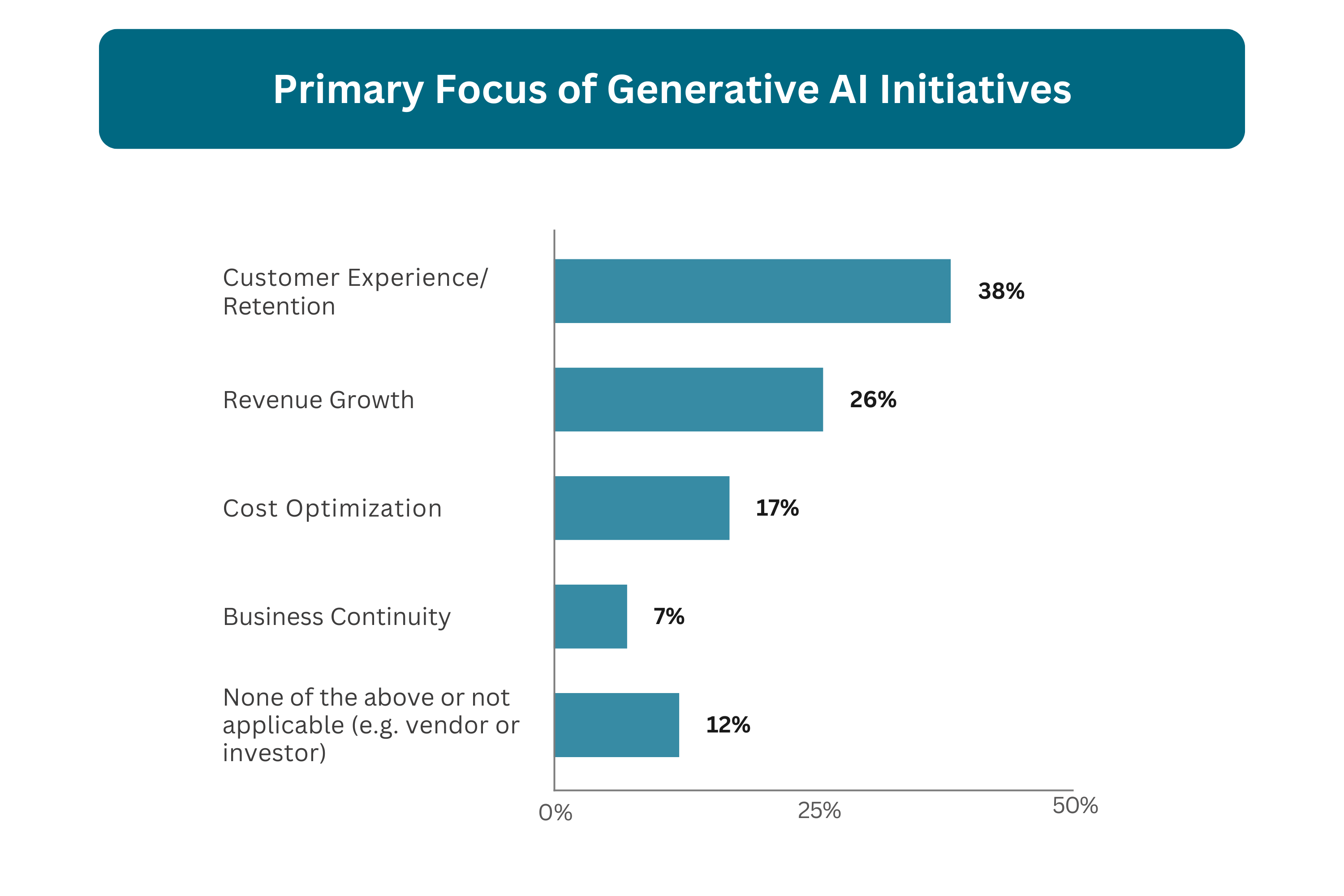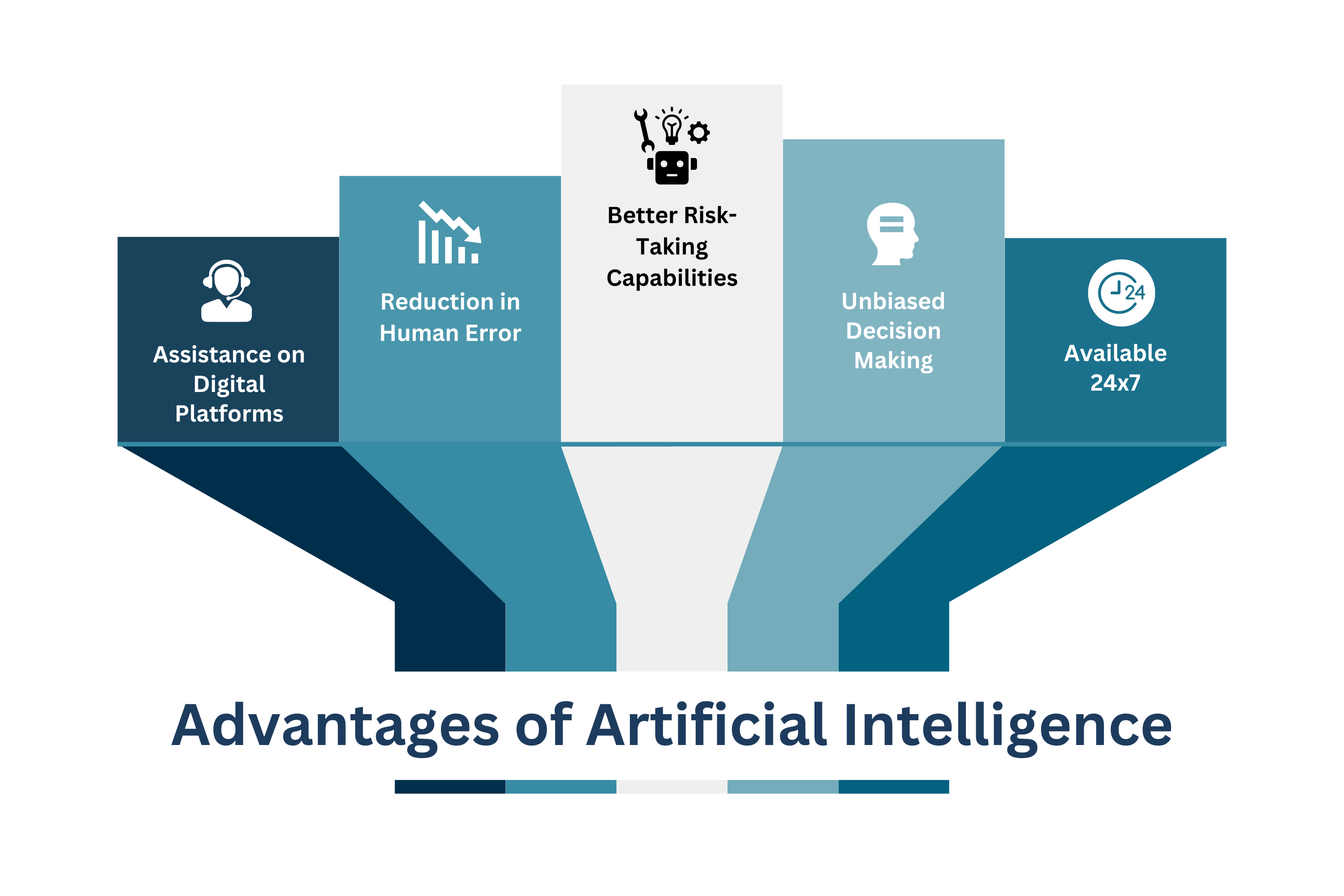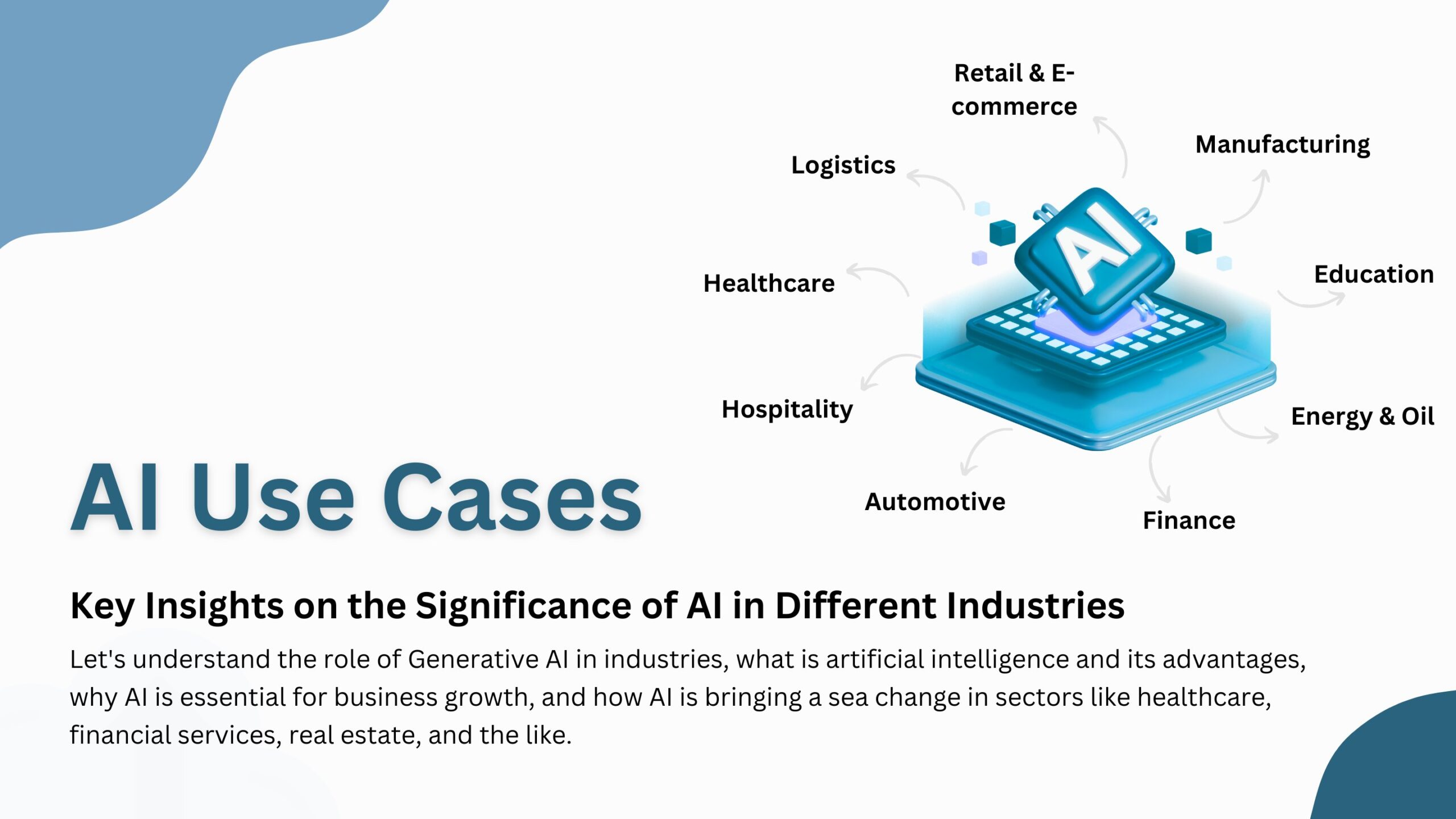“Artificial intelligence and generative AI may be the most important technology of any lifetime.”
– Marc Benioff, CEO, Salesforce
The growing momentum of AI is helping data teams across sectors excel in problem-solving approaches. AI holds the potential to provide human-like interactions with software and leverage machine learning algorithms to improve experiences. Let’s learn more about GenAI and trending AI technologies that wield business propositions for enterprises.
GenAI promises a leap in productivity and the proliferation of new modes of working and innovation. Conglomerates like Unilever are leveraging GPT API to create AI tools to minimize food wastage and filter emails sent to customer service departments. Tools like Midjourney and ChatGPT are growing popular for their capabilities, such as producing realistic images and generating human-like text.
The benefits of GenAI include enhanced employee productivity, faster product development, and improved customer experience. The graph below demonstrates that the primary focus of enterprises is on better customer retention.

Apart from enhancing customer experience, the next priority of enterprises lies in revenue growth, followed by cost optimization and other applications.
GenAI is steadily gaining prominence as a general-purpose technology and becoming as commonplace as electricity, the steam engine, or the internet. Users are tapping into generative AI capabilities like implementing large financial language models catering to cash flow, tax, accounting, etc.
What’s the Hype about Artificial Intelligence?
Artificial intelligence represents a branch of computer science that simulates human intelligence processes in machines and computer systems. This technology enables systems to perform tasks like humans, such as recognizing patterns in data, understanding natural language, and solving complex problems.
Artificial intelligence is used for predictive analytics, automating coding, and responding to cyberattacks, amongst other applications. The most prominent AI applications are natural language processing (NLP), computer vision, machine learning (ML), and robotics. Industries like retail, transportation, energy, and government sectors are witnessing a surge in AI applications.
Why is AI Important?
Over several centuries, scientists and inventors have strived to create autonomous machines that act, learn, and think like humans. Since the middle of the last century, tangible and measurable innovations in AI have come to the fore. This is all due to a demand for automating repetitive tasks, analyzing deeper data, increasing accuracy in decision-making, and the like.
AI can transform the relationship between people and technology and fundamentally change how businesses function. The capabilities of bots, automation, conversational platforms, and intelligent machines can be combined with large volumes of data to improve many technologies.
The below-mentioned infographic highlights the advantages of AI like assistance in risk-taking capabilities. Advanced algorithms are being deployed to accelerate data processing for predicting rare events and optimizing unique scenarios.

How is AI Transforming Different Industries?
AI can drive tools and tasks for almost any industry to maximize efficiency and productivity. The use cases for AI are gaining visibility in digital spaces like social media, finance, and even healthcare. Let’s learn more about how artificial intelligence is used in different industries and its significance for enterprises.
1. AI in Healthcare
According to a report, the global artificial intelligence market in healthcare was valued at USD 11 billion in 2021 and is expected to reach USD 188 billion by 2030. AI use cases in the healthcare sector are proving beneficial for cost- and time-efficient treatment, better accessibility of healthcare services, and improved preventive care services.
The best AI use cases in healthcare are improved patient engagement, decreased diagnostic time, and operational efficiencies in records management. The emergence of integrated contact centers for information sharing, AI-enabled diagnostics, and AI-led automated software are converting physician notes into billable medical codes. Such innovations are growing the AI market in healthcare.
2. AI in Financial Services
Growing dependency on digital payments and online platforms is leading to new artificial intelligence use cases in fintech. Customers are easily accessing information due to the availability of consistent and reliable 24/7 services. An increasing number of financial institutions are piloting or using AI in financial reporting.
Fintech is witnessing the growth of GenAI-powered virtual agents, text-to-speech technology, and ML-based recommendation solutions. These advancements are improving user experience by minimizing wait time, supporting natural interactions in customer support channels, and offering personalized products and services to customers. Improved collection workflows with customized messages and embedded repayment options contribute to an optimized customer experience.
3. AI in Real Estate
GenAI is playing a pivotal role in enhancing portfolio planning, supporting property operations, and improving acquisition strategies. This technology helps to automate the process of due diligence and provides insights that either support or prevent from making a transaction.
GenAI is gaining traction in HR, IT, and legal functions. It can be used in legal functions like procurement processes such as vendor selection and purchase order generation.Other AI use case examples include investor relations, finance & accounting, and asset management. GenAI can better target potential investors and maintain ongoing relationships.
AI in real estate is taking many valuable forms. It’s playing a crucial role in decision-making, providing insightful analytics, and optimizing customer experiences, thereby enhancing the overall efficiency of the industry.
4. AI in Media and Entertainment
With a global market size of $14.8 billion, sales and marketing dominated a revenue share of approximately 21.8% in 2022 for AI in media and entertainment. Smart AI frameworks are being used to develop innovative advertising and marketing solutions. Apps like Spotify and Netflix are becoming famous because they provide tailored user experiences and personalized tastes for all types of audiences.
GArtificial intelligence use cases are gaining importance in automated sports production with enhanced precision in live streaming and analytical services. Surging adoption of connected devices and intense competition amongst internet video streaming platforms is leading to innovations in sentiment and tone analysis, personality insights, and visual recognition.
5. AI in Manufacturing
Industry 4.0 is witnessing the rise of trends and technologies like the IoT (Internet of Things), virtual reality (VR), and robotics. Similarly, artificial intelligence is gaining prominence in manufacturing since decision-making is becoming more complex, and intelligent technology is needed to discover data patterns.
China, being the ‘factory of the world,’ is experiencing a growth in the adoption of AI. Favorable policies and ample funds are critical drivers for China’s growing AI implementations. Some of the best use cases for AI in manufacturing are smart production, supply chain management, and business model decision-making.
6. AI in Information Technology
AI use cases in the IT industry span many applications, such as software development, data analysis, cyber security, customer support, etc. Using AI for data analysis, QA (Quality Assurance) experts can eliminate human errors in software testing and quickly identify possible defects.
AI coupled with Robotic Process Automation (RPA) helps to automate routine tasks, freeing up time for the staff and employees to focus on important strategic tasks. Data scientists are developing ML algorithms to learn from historical fraud data and detect fraudulent transactions in real time. Artificial intelligence for IT operations (AIOps) helps teams to reduce downtime and decrease the time taken to identify & resolve IT issues.
Harness the Potential of AI with Help from AIT Global Inc.
To use AI to its full potential, data science teams and stakeholders should transition from siloed work to collaborative efforts. The future of AI & ML is marching toward embracing an agile mindset, which includes a test-and-learn approach to speed up development and minimize the fear of failure.
Eliminate guesswork and avail our AI services by connecting with our experts. These experts help you with a step-by-step guide to clearly define your business goals, choose the right tools and techniques, and continuously monitor performance to adjust your business strategies.
If you resonate with the insights shared in this blog, feel free to share them with your message in your network. Also, check out our AI blog series that shares important takeaways in finance, healthcare, manufacturing, and more.






 What is XBRL: Learn the Definition, its Benefits, and Trends
What is XBRL: Learn the Definition, its Benefits, and Trends  Agentic AI vs Generative AI: What’s the Difference and Why It Matters
Agentic AI vs Generative AI: What’s the Difference and Why It Matters  The Hidden Costs of Incorrect EDGAR Filing and XBRL Tagging – And How to Avoid Them
The Hidden Costs of Incorrect EDGAR Filing and XBRL Tagging – And How to Avoid Them  What is Agentic AI and How It’s Transforming Business Operations
What is Agentic AI and How It’s Transforming Business Operations  AI Tools For Small Businesses
AI Tools For Small Businesses